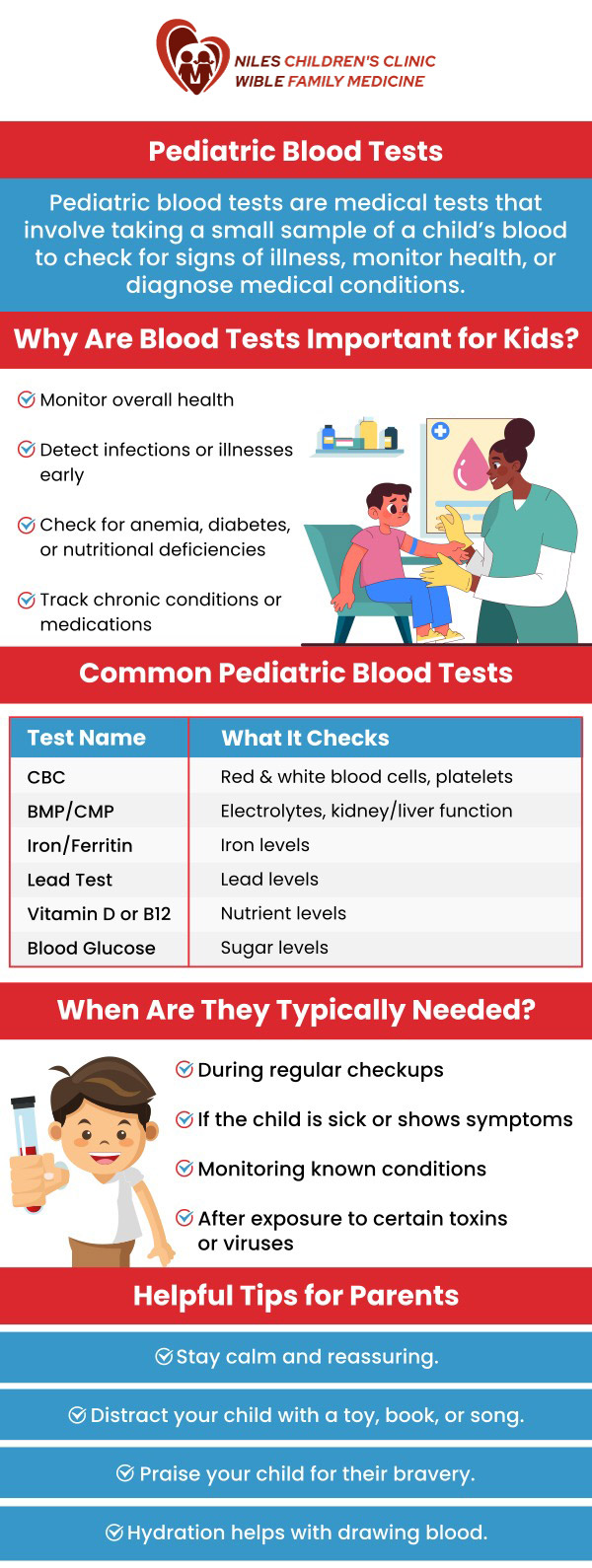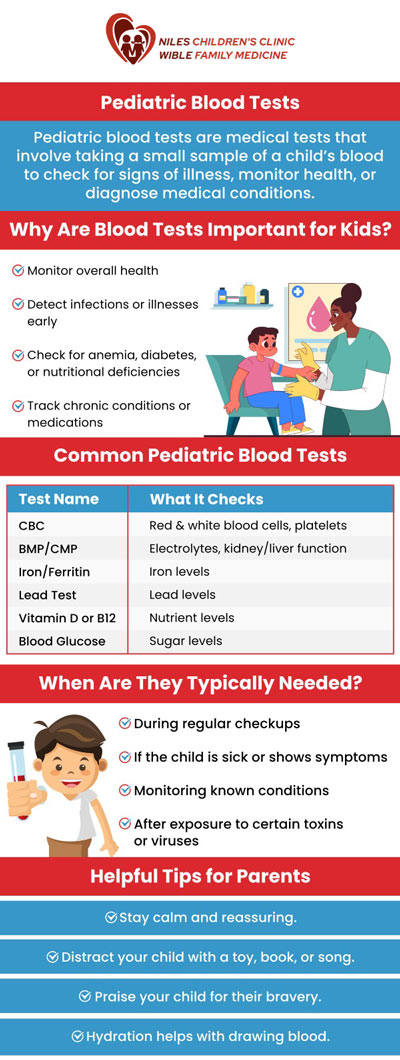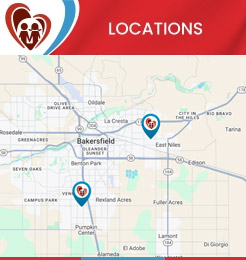Blood Test Guidelines for Children: Age-Based Recommendations
Universal Healthcare Services Inc. of Niles Children’s Clinic and Wible Family Medicine offer comprehensive blood test guidelines for children, tailored to their age and developmental needs. Our medical professionals offer age-based recommendations to facilitate early detection and effective health monitoring. These blood tests help identify potential health concerns, allowing for timely interventions to support your child’s well-being. For more information, contact us today or book an appointment online. We are conveniently located at Niles Children’s Clinic, and Wible Family Medicine in Bakersfield, CA.


Table of Contents:
What blood tests are recommended for infants (0-12 months)?
Are blood tests necessary for toddlers (1-3 years old)?
What blood tests are recommended for children (4-10 years old)?
What blood tests are needed for adolescents (11-18 years old)?
How often should blood tests be done during my child’s growth?
At Universal Pediatrics, we understand that the health and well-being of your infant is your top priority—and it’s ours too. When caring for babies from birth to 12 months, our approach to blood testing is guided by the latest pediatric guidelines and tailored to each child’s unique needs.
Key Tests for Infants (0-12 Months)
● Newborn Screening: Typically conducted within 24-48 hours after birth, this test screens for conditions like phenylketonuria (PKU), hypothyroidism, and cystic fibrosis.
● Hemoglobin and Hematocrit Test: This test is used to check for anemia, a common concern in infants, especially those who were born prematurely or have a low birth weight.
● Bilirubin Test: This test checks for jaundice, a condition where the baby’s liver doesn’t process bilirubin properly, causing yellowing of the skin and eyes.
Around the 6-month mark, infants may undergo additional tests depending on their health or family medical history. For instance, babies who are at higher risk for lead exposure, such as those living in older homes or with parents in high-risk professions, may need a lead screening test. Also, infants who have not been breastfed or have certain risk factors may require tests for iron deficiency anemia, as iron is essential for healthy development.
At Universal Pediatrics, we understand that parents want the best care for their growing toddlers. Blood tests are not routinely required for every child between the ages of 1 and 3 years old. In most cases, healthy toddlers who are growing and developing normally do not need regular blood work. However, there are certain situations where our pediatricians at Universal Pediatrics may recommend blood tests for your child.
For example, if your child is experiencing persistent fatigue, unexplained bruising, pallor, or poor growth, a blood test can help us diagnose possible conditions such as anemia, infections, or nutritional deficiencies. Additionally, if there is a family history of specific genetic or metabolic disorders, or if your child may be at higher risk for lead exposure—something that can be more common in certain neighborhoods—we may recommend specific screenings.
Our team may also suggest routine screening tests, such as checking for anemia or lead exposure, during certain well-child visits, especially if your child has particular risk factors. The decision to recommend blood tests is always based on your child’s unique medical history, physical exam findings, risk factors, and any symptoms they may be experiencing.
If you have any concerns about your toddler’s health or development, we encourage you to discuss them with your Universal Pediatrics provider. We’ll work with you to determine if blood tests or other evaluations are necessary for your child. While blood tests can be an important diagnostic tool, our approach is always to use them selectively and only when needed—they are not a standard requirement for every toddler.
At Universal Pediatrics, the health and well-being of your child are our top priorities. For most children between ages 4 and 10, routine blood tests are not required unless recommended by our pediatricians based on your child’s symptoms, risk factors, or family history. However, there are some situations where blood tests may be important to monitor your child’s growth, development, and overall health.
Common Blood Tests We May Recommend:
● Complete Blood Count (CBC): Helps evaluate overall health and detect conditions like anemia, infection, or blood disorders.
● Lead Level Testing: Recommended if your child is at risk of lead exposure, particularly in older homes.
● Iron Studies: Ordered if signs of iron deficiency, fatigue, or poor nutrition are present.
● Cholesterol and Lipid Profile: Recommended for children with risk factors like being overweight or having a family history of high cholesterol.
● Diabetes Screening: Performed if your child shows symptoms or has risk factors for diabetes.
● Other Specialized Tests: May include tests for liver, kidney, thyroid function, or vitamin and nutrient levels based on your child’s health needs.
Every child is unique. At Universal Pediatrics, our pediatricians take the time to review your child’s medical and family history, conduct a thorough examination, and discuss any symptoms before recommending any blood tests.
At Universal Pediatrics, we are committed to supporting the health and development of adolescents ages 11 to 18. During these important years, certain blood tests may be recommended to monitor overall health, screen for potential concerns, and enable early intervention when needed. The specific tests we suggest at Universal Pediatrics are always tailored to each adolescent’s unique health history, family risk factors, and any current symptoms.
Common Blood Tests for Adolescents:
● Complete Blood Count (CBC): Helps assess general health and detect anemia or infections.
● Lipid Screening: Recommended between ages 9-11 and 17-21 to identify cardiovascular risks.
● Blood Glucose Testing: Checks for diabetes risk factors like obesity or family history.
● Iron Deficiency Screening: Important for menstruating females to prevent anemia.
● Thyroid Function Tests: Recommended if there are unexplained changes in weight, mood, or energy.
● Additional Screening: May include tests for vitamin D deficiency, STIs, or liver/kidney function based on risk factors.
At Universal Pediatrics, we tailor testing to your child’s health needs. Wellness visits are the perfect time to discuss these tests and create a personalized care plan. Our pediatricians are here to guide you every step of the way.
At Universal Pediatrics, blood tests are typically not required at every check-up for healthy children. Tests are generally recommended when your child shows symptoms such as fatigue, persistent infections, or slow growth.
After birth, newborn screening checks for metabolic or genetic conditions. Between ages one and two, we may recommend anemia screening if there are risk factors. As children reach adolescence, tests for cholesterol or blood sugar may be considered, especially with a family history or risk factors like obesity. Children with chronic conditions or abnormal results may need more frequent monitoring.
We encourage parents to discuss blood testing during well-child visits to ensure your child’s health and development are on track.
If you have questions about your child’s specific needs, or want to learn more about blood tests and screenings at Universal Pediatrics, please contact our office. We’re here to support your family at every stage of your child’s development. For more information, contact us today or book an appointment online. We are conveniently located at Niles Children’s Clinic, and Wible Family Medicine in Bakersfield, CA. We serve patients from Bakersfield CA, Maltha CA, Kayandee CA, Burness CA, Clovis CA, Panama CA, Alameda CA, and surrounding areas.


Additional Services You May Need
▸ Well-Child Visits
▸ Sick Visits
▸ Immunizations
▸ Chronic Disease Management
▸ Newborn Care
▸ Developmental Screenings
▸ School Physicals
▸ Nutritional Counseling
▸ Behavioral Health Support
▸ Hearing and Vision Screenings
▸ Lactation Support
▸ All Services






